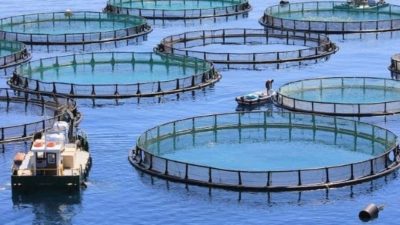| Course Credits | | 3 (3-0-6) |
| Course Abbrviation | | PRIN AQUACULTURE |
| Course Title (TH) | | หลักวาริชกรรมการเพาะเลี้ยง |
| Course Title (EN) | | PRINCIPLES OF AQUACULTURE |
| Responsible Unit | | Faculty of Science, Department of Marine Science |
| Type of Course | | International Course |
| Semester | | Intl 1st semester |
| Academic Year | | 2024 |
| Course Coordinator | | |
| Measurement Method | | |
| Type of Course | | Semester Course |
| Course Condition | | None |
| Course Status | | Elective |
| Instructors / staffs | | |
| Enrollment conditions | | None |
| Degree level | | Bachelor |
| Related curricular | | Bachelor of Science in Biotechnology (2562) |
| | Bachelor of Science in Biotechnology (2567) |
| Course description (TH) | | ประวัติความเป็นมาของวาริชกรรมเพาะเลี้ยง บทบาทของวาริชกรรมการเพาะเลี้ยงที่มีต่อการประมงโลก กระบวนการวิจัยและพัฒนาทางวาริชกรรมการเพาะเลี้ยง วาริชกรรมการเพาะเลี้ยงเกี่ยวกับการเพาะพันธุ์ การเลี้ยงตัวอ่อน โภชนาการและการจัดการฟาร์ม วิธีการทางวาริชกรรม การเพาะเลี้ยงประเภทต่างๆ ของสาหร่ายทะเล กุ้ง ปู หอย ปลา และสัตว์เลื้อยคลานที่มีความสําคัญทางเศรษฐกิจ |
| Course description (EN) | | History of aquaculture; roles of aquaculture on world fisheries; research and development process in aquaculture; principles of aquaculture related to breeding; larviculture, nutrition and aqua-farm management; methodology of different types of aquaculture related to economically important sea-weeds, crustaceans, mollusks, fishes, and reptiles. |
| Curriculum mapping | / | CU-1.1: Behavioral Objectives Possessing well-rounded knowledge |
| / | CU-1.2: Possessing in-depth knowledge |
| | CU-2.1: Being moral and ethical |
| / | CU-2.2: Having an awareness of etiquette |
| | CU-3.1: Being able to think critically |
| / | CU-3.2: Being able to think creatively |
| / | CU-3.3: Having skills in problem solving |
| / | CU-4.1: Having professional skills |
| | CU-4.2: Having communication skills |
| | CU-4.3: Having skills in information technology |
| | CU-4.4: Having mathematical and statistical skills |
| / | CU-4.5: Having management skills |
| / | CU-5.1: Having an inquiring mind |
| / | CU-5.2: Knowing how to learn |
| | CU-5.3: Having leadership qualities |
| | CU-5.4: Maintaining well-being |
| | CU-5.5: Being community-minded and possessing social responsibility |
| / | CU-5.6: Sustaining Thainess in a globalized world |
| / | subPLO1.1 Explain biotechnology knowledge in practice. |
| | subPLO1.2 Analyze biotechnology knowledge in practice. |
| | subPLO1.3 Apply biotechnology knowledge in practice. |
| / | PLO2 Employ biotechnology-related technology and scientific tools. |
| | PLO3 Communicate effectively in English within the Biotechnology field. |
| | PLO4 Demonstrate behavior that aligns with ethical principles, moral values, and professional ethics. |
| | PLO5 Demonstrate social responsibility, courage, and creativity. |
| Course learning outcome (CLO) | | 1. Be able to describe important basic knowledge in breeding, larviculture, nutrition and farm management can be used in aquaculture. |

